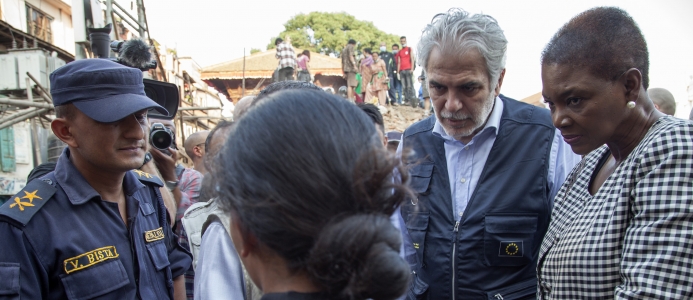At the end of their joint visit to earthquake-stricken Nepal, the UN and EU humanitarian affairs chiefs issued the following joint press release:
The Emergency Relief Coordinator and EU Commissioner for Humanitarian Aid conclude their joint visit to Nepal
(Kathmandu/Bangkok/Geneva/New York, 2 May 2015) The United Nations Under-Secretary- General for Humanitarian Affairs and Emergency Relief Coordinator, Valerie Amos, and the European Union’s Commissioner for Humanitarian Aid and Crisis Management, Christos Stylianides concluded their joint visit to Nepal. On the last day of their visit they met with the Honourable Prime Minister Sushil Koirala and reaffirmed the commitment of the international community to support the country in this time of crisis.
“A disaster of such magnitude would test the capacities of any government in the world,” said Mr. Stylianides. The Nepalese people can rest assured that we will stand by them, Nepal is not alone in this crisis”.
“My thanks to the Prime Minister for his clear message on the importance of working in partnership to speed up aid delivery,” said Ms. Amos. “I assured him of the international community’s strong commitment to provide the necessary support.”
During their visit, the UN and EU aid officials witnessed the devastation caused by the 7.8 magnitude earthquake that struck a week ago and met with people who were directly affected. They also had an opportunity to meet those on the front lines of the relief effort, including search and rescue (SAR) teams, medical professionals, and aid workers. Ms. Amos and Mr. Stylianides also met with senior representatives of local and national authorities, as well as financial and technical partners.
Seven days into the relief operation, a significant amount of national and international aid and responders are being used. Teams are working around the clock to reach those affected. Helicopters and aircraft are particularly needed to reach those in the most remote areas.
The UN and EU aid chiefs repeatedly stressed the urgent need to provide emergency shelter to hundreds of thousands of people, particularly in the rural areas. This is especially important given the fast approaching monsoon season. Healthcare and sanitation are also priorities.
To date, some US$ 68 million was provided in support of the ongoing response.


